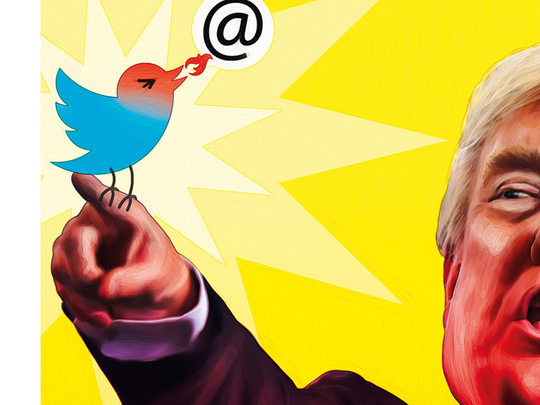
United States President Donald Trump acknowledges his debt to Twitter. Without it, he once said, he’d never be President. And you can see why: He follows just 45 people, but is followed by 44 million. This million-to-one ratio rises even higher when you think of the media: For every word of his tweets, several million words will be published in response. In this way, his Twitter account becomes a remote control for news. He chooses the topic, his critics condemn him — but they talk all day about a subject of his choice. They rise to the bait every time.
We’re now more than two years into the Trump phenomenon and, still, his main tactic isn’t properly understood. He has fused politics and show business, and the audiences are too busy booing to work out that they have all, nonetheless, turned up at his performance. The latest on retweeting videos from a group of far-right cranks called Britain First, was an appalling insult to an ally. British Prime Minister Theresa May was quite right to condemn it, and then say no more.
The very word “twitter” sounds like an irrelevance, a distracting toy for a self-obsessed political class. It’s a forum where the strongest expressions of outrage (or piety) attract the most ‘likesl or ‘shares’ — so people need things to react against. This is where Trump steps in. He gets up at 5am and is ready to tweet (or, as he puts it, “go bing, bing, bing”) by 6am. With just a few words, he can cause uproar and change the national conversation by 7am — itself quite a feat. And if he’s attacked? No problem. His aim is to have his favourite topics discussed, so the battle is fought on territory of his choosing.
The effectiveness of all this was recently documented by a Harvard University study into two million news stories written before the last presidential election. It showed that journalists largely followed Trump’s agenda, wittingly or not. In denouncing him, they played into his hands. Immigration, the topic that benefited him the most, became the defining issue of the campaign. Coverage of Hillary Clinton, however, focused on scandals: Her deleted emails and the financing of her husband’s foundation. And the “fake news” that we hear so much about? An irrelevant distraction. Yes, there were a small number of made-up stories, but they were usually ignored.
This enrage-and-derange tactic is seldom used in Britain, with one noteable exception. In the European Union (EU) referendum, Vote Leave famously claimed that Britain sends £350 million (Dh1.73 billion) a week to Brussels. At the time, this puzzled me: The figure doesn’t take account of the rebate, so why not use the smaller, less contentious net figure: £275 million? But the whole point of using the larger figure was to drive the other side berserk (they obliged every time) and steer the conversation on to the topic of how much Britain pays into the EU. Whichever figure you choose, it’s still rather a lot of money.
Those around Trump admire his ability to dominate the news and bend the universe towards him. He has a gift for talking in a way that cuts through to ordinary Americans. Hillary Clinton’s long, formulaic speeches can go in one ear and out of the other; a Trump tweet can have people talking for days. As we are seeing now.
And then, his targets — ideally, he’ll choose a topic where the political elite is out of step with public opinion. Take his most controversial ideas: a wall with Mexico, banning Muslims from emigrating to America, torturing terror suspects. Polls show huge public support for each of these ideas, so there was always a massive gap in the political market for Trump’s style of “America First” politics. It conveys something else: That he understands the anger of those who feel ignored and abandoned.
Team Trump’s other working assumption is that partisanship now governs American politics. That the era of former US president Ronald Reagan was the last one with politicians who fought in wars together, and were bound together by a shared experience. Today, it’s tribal — and the winner is the one that best enthuses their core supporters. Much is made of Trump’s low national approval ratings, but among Republicans they’re pretty high: 81 per cent at the last count. So it’s probable that he’ll be a two-term president.
It’s very rare for any American president, no matter how unpopular, to lose a bid for reelection in a growing economy — and even now, there are no signs that the Democrats will find a decent candidate to pit against Trump.
— The Telegraph Group Limited, London, 2017
Fraser Nelson is the editor of the Spectator and a senior columnist for the Daily Telegraph.









